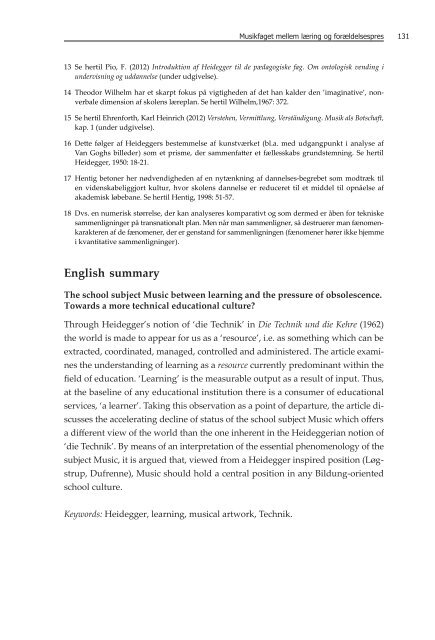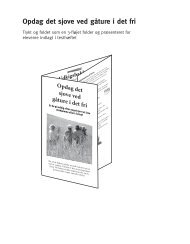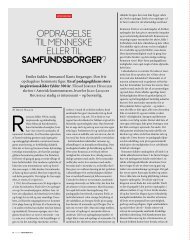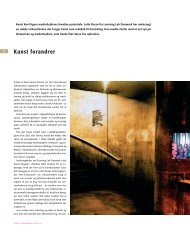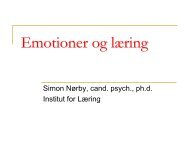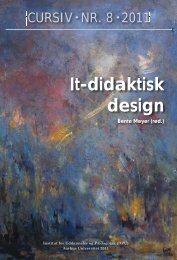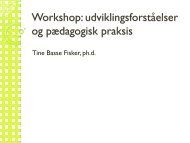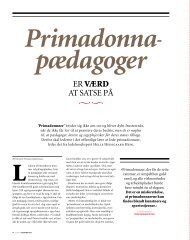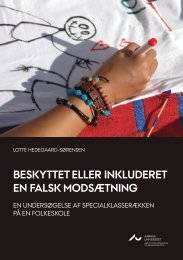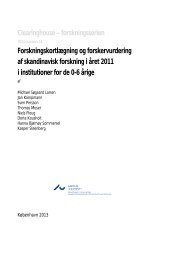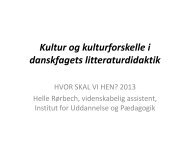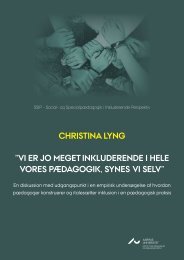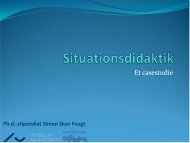Sammenlignende fagdidaktik 2 - Institut for Uddannelse og ...
Sammenlignende fagdidaktik 2 - Institut for Uddannelse og ...
Sammenlignende fagdidaktik 2 - Institut for Uddannelse og ...
You also want an ePaper? Increase the reach of your titles
YUMPU automatically turns print PDFs into web optimized ePapers that Google loves.
13 Se hertil Pio, F. (2012) Introduktion af Heidegger til de pædag<strong>og</strong>iske fag. Om ontol<strong>og</strong>isk vending i<br />
undervisning <strong>og</strong> uddannelse (under udgivelse).<br />
14 Theodor Wilhelm har et skarpt fokus på vigtigheden af det han kalder den ’imaginative’, nonverbale<br />
dimension af skolens læreplan. Se hertil Wilhelm,1967: 372.<br />
15 Se hertil Ehren<strong>for</strong>th, Karl Heinrich (2012) Verstehen, Vermittlung, Verständigung. Musik als Botschaft,<br />
kap. 1 (under udgivelse).<br />
16 Dette følger af Heideggers bestemmelse af kunstværket (bl.a. med udgangpunkt i analyse af<br />
Van G<strong>og</strong>hs billeder) som et prisme, der sammenfatter et fællesskabs grundstemning. Se hertil<br />
Heidegger, 1950: 18-21.<br />
17 Hentig betoner her nødvendigheden af en nytænkning af dannelses-begrebet som modtræk til<br />
en videnskabeliggjort kultur, hvor skolens dannelse er reduceret til et middel til opnåelse af<br />
akademisk løbebane. Se hertil Hentig, 1998: 51-57.<br />
18 Dvs. en numerisk størrelse, der kan analyseres komparativt <strong>og</strong> som dermed er åben <strong>for</strong> tekniske<br />
sammenligninger på transnationalt plan. Men når man sammenligner, så destruerer man fænomenkarakteren<br />
af de fænomener, der er genstand <strong>for</strong> sammenligningen (fænomener hører ikke hjemme<br />
i kvantitative sammenligninger).<br />
English summary<br />
The school subject Music between learning and the pressure of obsolescence.<br />
Towards a more technical educational culture?<br />
Through Heidegger’s notion of ‘die Technik’ in Die Technik und die Kehre (1962)<br />
the world is made to appear <strong>for</strong> us as a ‘resource’, i.e. as something which can be<br />
extracted, coordinated, managed, controlled and administered. The article exami-<br />
nes the understanding of learning as a resource currently predominant within the<br />
field of education. ‘Learning’ is the measurable output as a result of input. Thus,<br />
at the baseline of any educational institution there is a consumer of educational<br />
services, ‘a learner’. Taking this observation as a point of departure, the article di-<br />
scusses the accelerating decline of status of the school subject Music which offers<br />
a different view of the world than the one inherent in the Heideggerian notion of<br />
‘die Technik’. By means of an interpretation of the essential phenomenol<strong>og</strong>y of the<br />
subject Music, it is argued that, viewed from a Heidegger inspired position (Løg-<br />
strup, Dufrenne), Music should hold a central position in any Bildung-oriented<br />
school culture.<br />
Keywords: Heidegger, learning, musical artwork, Technik.<br />
Musikfaget mellem læring <strong>og</strong> <strong>for</strong>ældelsespres<br />
131


